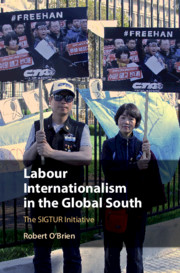LeBaron, Genevieve, ed. 2019. Researching
Forced Labour in the Global Economy: Methodological Challenges and Advances.
Oxford: Oxford University Press.
Edited by Genevieve LeBaron, Professor of Politics and Co-Director of the Sheffield Political Economy Research Institute (SPERI), University of Sheffield
Genevieve LeBaron is Professor of Politics and Co-Director of Sheffield Political Economy Research Institute (SPERI) at the University of Sheffield. She is also Co-Chair of the Yale University Modern Slavery Working Group. She has been awarded the British Academy 'Rising Star Engagement Award' for her work on forced labour by the British Academy for the Humanities and Social Sciences and was included in the global 'Top 100 Human Trafficking and Slavery Influence Leaders List'. Her research focuses on the business dynamics of forced labour in global supply chains, as well as the effectiveness of private governance systems to combat it.
Contributors:
Jean Allain, Monash University
Robert Caruana, Nottingham University Business School
Jenny Chan, Hong Kong Polytechnic University
Andrew Crane, University of Bath
Neil Howard, University of Antwerp
Genevieve LeBaron, University of Sheffield
Sam Okyere, University of Nottingham
Nicola Phillips, Kings College London
Jessica Pliley, Texas State University
Joel Quirk, University of Witwatersrand
Andreas Rühmkorf, University of Sheffield
Robert Caruana, Nottingham University Business School
Jenny Chan, Hong Kong Polytechnic University
Andrew Crane, University of Bath
Neil Howard, University of Antwerp
Genevieve LeBaron, University of Sheffield
Sam Okyere, University of Nottingham
Nicola Phillips, Kings College London
Jessica Pliley, Texas State University
Joel Quirk, University of Witwatersrand
Andreas Rühmkorf, University of Sheffield
https://global.oup.com/academic/product/researching-forced-labour-in-the-global-economy-9780197266472?cc=hk&lang=en&#

